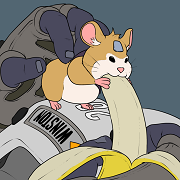|
Child rearing isn't always seen as a political issue, and when it is it's often treated as the ultimate example of frivolous and stupid knee jerk politics of the Helen Lovejoy variety. When I hear children and politics in the same sentence my first thought is typically of politicians arguing for GPS' on school buses or restrictions on internet browsing. On the other hand parenting and child rearing say a lot about our society and values, and presumably the way we raise children influences the future shape of society. So on that note I've become increasingly curious in the political and psychological implications of letting children play unsupervised, and in particular the question of when and how far children should be allowed to range outside the physical boundaries of their home. It's become a bit of a cliche to point out that middle class or wealthy kids don't have as much free and unstructured time as they did in the past. They're shipped off to sports practices, language lessons, music classes, etc. There are rumblings about whether rich kids are being given an unfair advantage by their helicopter parents, and you're also hearing people complaining that the joy and spontaneity of make believe play is being crowded out by structured activities. All of this dovetails neatly with concerns that computer games, smart phones and social media are corrupting childhood. My particular interest, though, is this question of when kids should be given free reign to explore their physical surroundings. I have pretty vivid memories of ranging around my neighborhood and nearby areas from what now seems like a pretty young age, and I would be inclined to say that if anything my parents (or at least my mother) were more protective and paranoid than average. Yet I was walking home or taking public transit by the time I was 9 years old and playing unsupervised with other kids in downtown public parks a few blocks from my house without any parental oversight. Here's a child rearing "expert" showing up on some Fox News program in 2014 suggesting that the appropriate age for children to go out for even a short, half hour period would be 12 or 13, with the entire reasoning amounting to little more than "child molesters exist". On the other end of the spectrum you have the so called 'free range kids' movement essentially arguing that these generational changes are killing childhood. Since, in some level, community rearing ends up being a political issue, I thought it'd be interesting to debate this from that perspective. What are the pros and cons of letting children roam free, are there serious dangers to to unsupervised young children wandering the streets at an earlier age, and at what point does it become appropriate for state authorities to intervene?
|
|
|
|

|
| # ? Apr 18, 2024 01:29 |
|
I'm glad you made this thread because this is one of my pet issues, and one thing that I think doesn't get enough discussion. In the course of the last couple generations it does seem that we've moved quite drastically towards sheltering children. My dad (born 1955, grew up in a lower-middle class area of Southern California), talks about how when he was growing up, after school, the kids would just be all playing in the general neighborhood essentially unsupervised, and then at dinnertime, all the moms would just come out into their front yards and yell for their kids to come in. That's something that's almost unfathomable today, except for maybe very poor neighborhoods where kids wandering around seems more common (at least, I noticed this when I was a missionary in Alabama). I'm planning on moving to Germany later this year, and one of the reasons I like the idea of living in Germany is that kids there are pretty clearly more independent than kids in the states. For example, I saw plenty of kids around ~10 or so biking around town by themselves, something you don't see that much of in the US, especially since biking here is usually dangerous. Kids here might bike themselves through low-traffic residential streets to get to a friend's house, but that's about it. Another example (original article from WSJ) - http://pastebin.com/T3fv3N7w quote:Tilda Geyer got away from her parents on a trip to a lake last summer. She and 10 friends slept in tents, rode horses, picked berries and flew on a rope swing over the water. At night, they sang around a campfire. Some other resources on this subject that I like:  (from the Daily Mail, but still an interesting image) The Overprotected Kid quote:The Land is an “adventure playground,” although that term is maybe a little too reminiscent of theme parks to capture the vibe. In the U.K., such playgrounds arose and became popular in the 1940s, as a result of the efforts of Lady Marjory Allen of Hurtwood, a landscape architect and children’s advocate. Allen was disappointed by what she described in a documentary as “asphalt square” playgrounds with “a few pieces of mechanical equipment.” She wanted to design playgrounds with loose parts that kids could move around and manipulate, to create their own makeshift structures. But more important, she wanted to encourage a “free and permissive atmosphere” with as little adult supervision as possible. The idea was that kids should face what to them seem like “really dangerous risks” and then conquer them alone. That, she said, is what builds self-confidence and courage. Risky Play: Why Children Love It And Need It quote:From an evolutionary perspective, the obvious question about risky play is this: Why does it exist? It can cause injury (though serious injury is rare) and even (very rarely) death, so why hasn’t natural selection weeded it out? The fact that it hasn’t been weeded out is evidence that the benefits must outweigh the risks. What are the benefits? Laboratory studies with animals give us some clues.
|
|
|
|
My personal opinion would be that if they are old enough to sent out to go to school, they are old enough to play unsupervised. Basically, childhood could be seen as an increasing set of worlds opening up for children. First, they pretty much are at home, or never far from their parents. Then it expands to the neighborhood and school, and then it expands further as they learn to drive, and then college, and then they're out in the "real world", theoretically free to do whatever. This is tied to increasing ability to self-define as well as experience and knowledge and desire to do so. However, that's assuming the perfect suburban upbringing. On one hand, there is a disturbing lack of thought in what kids are exposed to, but also a disturbing lack of trust in kids' own abilities to take care of themselves or have a rich mental life, even if it's not as subtle or deep as an adults. I think a lot of the helicopter parenting is a result of parents' own sheltered lives, where they basically just exist at home, in their car, work, or at a store. A result of the general lack of civic engagement across America. I don't have easy answers.
|
|
|
|
The history of childhood play is something I've been interested in reading about but haven't really gotten around to yet. I do recall reading that there's been a bit of a historical pendulum for children's playtime, and that in the 19th century and in the colonial period in America, children's unsupervised playtime was substantially more restricted than it was in the mid to late 20th century even among the privileged classes of those eras. I don't have much doubt that more unsupervised playtime is better, but I wonder what the historical and cultural norms are once you expand the scope beyond 20th and 21st century Western countries. If anyone has any recommendations for reading on the subject, I'd love to take a look. Here's one thing I ran across that looks kind of interesting: http://www.nytimes.com/packages/pdf/books/Chudacoffchapter1.pdf
|
|
|
|
Given how often kids get molested and abused by people they know, like priests, hockey coaches, parents, relatives, etc., I find it very odd that parents are scared that strangers will grab their kids off the street and gently caress them. Being "unsupervised" would seem to offer the least opportunity to be molested or otherwise abused. Not to mention, if kids stick to public places, they're never entirely unsupervised. I've been to cities where it's common to see kids not under direct supervision, and you better believe that I'd step in, as most people would, if I saw a kid being abducted or assaulted or anything like that. On the other hand, I've seen parents spanking their child in public, and the truth is that there's not much you can do about that kind of abuse, as much as you might want to. Children are safest when not directly supervised, IMO 
|
|
|
|
Unless the change literally happened in the last 20 years or so, I don't think that children playing outside is exactly rare, at least in more suburban or rural areas. I lived in an area that was definitely suburban and not remotely rural, and just doing whatever outside (usually this just meant biking around) with my nearby friends was very normal around the mid-90s. While I guess I could be wrong, I did not feel like this experience was out of the ordinary. While my younger cousin had a much different experience (the only excursions he ever had were "play-dates" set up by my aunt), he also lived in a more urban, wealthy area and that seemed to be a (dumb, because his neighborhood is super safe) cultural norm of sorts in the neighborhood. My aunt is also abnormally overprotective. So I guess that the culture that is really weird and overprotective about kids definitely exists, but I'm not sure if it's so common it applies to the majority of children.
|
|
|
|
Ytlaya posted:Unless the change literally happened in the last 20 years or so, I don't think that children playing outside is exactly rare, at least in more suburban or rural areas. I lived in an area that was definitely suburban and not remotely rural, and just doing whatever outside (usually this just meant biking around) with my nearby friends was very normal around the mid-90s. While I guess I could be wrong, I did not feel like this experience was out of the ordinary. While my younger cousin had a much different experience (the only excursions he ever had were "play-dates" set up by my aunt), he also lived in a more urban, wealthy area and that seemed to be a (dumb, because his neighborhood is super safe) cultural norm of sorts in the neighborhood. My aunt is also abnormally overprotective. So I guess that the culture that is really weird and overprotective about kids definitely exists, but I'm not sure if it's so common it applies to the majority of children. Except it probably has changed. I'll have more of a window into this as my infant daughter gets older but my impression is that it's increasingly uncommon for kids to walk to school or ride bikes around afterward. I was walking over a mile to elementry school circa 1990 and spending afterschool riding anywhere I wanted with friends on our bikes by about age 12 (which was sometimes many miles away). By 13 I could go anywhere I wanted in the family boat (an inflatable with an outboard) on our summer vacations on a very large lake. My wife lead herself and her younger sister on public transit downtown at about age 10 and spent after school . As far as I know those things are all pretty rare today. The saddest thing about this trend (though I do want to be a little cautious because I'm not sure what data there is to quantify it) is that it's probably based on complete ignorance - the "these days' notion that things are less safe when actually they're not. Chidren are not at greater risk in any way that I'm aware than they have been at any time in the past and the notable ones like kidnapping and violence are generally down in the last couple decades. Meanwhile cell phones and better medical care should reduce risks of things people used to do (you can't get lost anymore and can always call for help with a phone). Meanwhile most parents are still going to let their kids get behind the wheel at age 16 or 17 which is by far the most dangerous thing they're going to do and more so if driving is the first time they have real freedom. The most interesting question, besides the existence of the trend is why? Is it media, and how does it relate to other political and social issues that have similarly shifted. http://www.theatlantic.com/magazine/archive/2014/04/hey-parents-leave-those-kids-alone/358631/ The Atlantic posted:One very thorough study of “children’s independent mobility,” conducted in urban, suburban, and rural neighborhoods in the U.K., shows that in 1971, 80 percent of third-graders walked to school alone. By 1990, that measure had dropped to 9 percent, and now it’s even lower. When you ask parents why they are more protective than their parents were, they might answer that the world is more dangerous than it was when they were growing up. But this isn’t true, or at least not in the way that we think. For example, parents now routinely tell their children never to talk to strangers, even though all available evidence suggests that children have about the same (very slim) chance of being abducted by a stranger as they did a generation ago. Maybe the real question is, how did these fears come to have such a hold over us? And what have our children lost—and gained—as we’ve succumbed to them?
|
|
|
|
asdf32 posted:Chidren are not at greater risk in any way that I'm aware than they have been at any time in the past and the notable ones like kidnapping and violence are generally down in the last couple decades. Meanwhile cell phones and better medical care should reduce risks of things people used to do (you can't get lost anymore and can always call for help with a phone). from what i've found a pretty common cause of pediatric injury/death is being hit by a car, and this is increasing - typically tweens or older children jaywalking in twilight
|
|
|
|
The kids in my neighborhood, about 6-8, play outside on our street unsupervised There's a few kids probably around 8-10 playing in the park a few blocks away unsupervised.
|
|
|
|
Popular Thug Drink posted:from what i've found a pretty common cause of pediatric injury/death is being hit by a car, and this is increasing - typically tweens or older children jaywalking in twilight It's definitely possible to fix this (IIRC the Netherlands has an extremely low incidence of child traffic fatalities due to safety-oriented engineering and culture), but most Americans care more about going fast than not killing people. Just the other year the speed limits went down a bit in NYC and there were all sorts of complaints about how the city was being strangled or other nonsense. And this is in what is probably the most pedestrian-oriented major city in the US! edit: quote:Cycling in the Netherlands declined sharply in the post-second world war period. In the 1950s and 1960s, existing cycle paths were in many cases removed in order to make space for more cars. "From 1950 to 1975, the bicycle was almost entirely excluded from the government's vision"(Dutch Bicycle Master Plan 1999). The number of deaths on the roads rose, especially amongst children on their way to and from school. In 1972, a total of 3264 people were killed on Dutch roads, and at around the same time, in 1973, 450 road deaths were of children. Cicero fucked around with this message at 01:57 on Mar 23, 2016 |
|
|
|
as much as parents like to accuse each other of being scared of strangers, i think the bigger factor is the built environment. never have more americans lived in automobile-dependent suburbs, which may or may not have sidewalks depending on how much money your parents make. a bunch of clusters of apartment complexes all crowded along a six lane fast moving arterial is just as much a suburb as a nice safe subdivision when i was a kid the biggest thing my parents were worried about was me getting hit by a car, because i lived on a relatively quiet road rural exurban that had no sidewalks. i also had a gigantic forest to run around in. i dont remember when i was allowed to go out on my own but i remember walking to friends' houses at like age 6 or 7 at least now i live in an apartment complex on an arterial with my toddler. i'd let her play outside with the neighborhood kids semi-supervised at about age 6 or so, but it's mostly just a parking lot and some people just fly through here like idiots. i wouldn't let her leave the neighborhood on her own until she was like 12 i guess. if she could prove to me that she can handle it i'd let her ride the bus then too. if i could get a place in a quieter neighborhood i'd be less restrictive because traffic would be both slower and easier to avoid e: also in the last 12 months i've seen two different younger people, teens or young adult couldn't tell, get hit and seriously injured by cars right outside my front gates boner confessor fucked around with this message at 02:03 on Mar 23, 2016 |
|
|
|
My dad was a hippy survivalist and my mom is a paranoid Mormon and i was raised in a very rural part of Arizona and I was allowed to go out unsupervised at ~5-6. This was in the early 80s.
|
|
|
|
Popular Thug Drink posted:as much as parents like to accuse each other of being scared of strangers, i think the bigger factor is the built environment. never have more americans lived in automobile-dependent suburbs, which may or may not have sidewalks depending on how much money your parents make. a bunch of clusters of apartment complexes all crowded along a six lane fast moving arterial is just as much a suburb as a nice safe subdivision Sidewalked suburban sprawl has increased and may be boring but is ideal for kids on foot or bike. Semi-urban areas you describe don't sound ideal for exploration but I'm not sure they've proportionally increased. And they have nothing to do with why parents might not let their kids explore the woods or roam in areas which are safe.
|
|
|
|
asdf32 posted:Sidewalked suburban sprawl has increased and may be boring but is ideal for kids on foot or bike. Semi-urban areas you describe don't sound ideal for exploration but I'm not sure they've proportionally increased. And they have nothing to do with why parents might not let their kids explore the woods or roam in areas which are safe. i'm arguing that there's a socioeconomic factor at play - subdivisions are pretty safe with or without sidewalks, so long as you don't leave the subdivision. a lot of kids grow up in apartment complexes though where you're naturally closer to a heavier volume of traffic. i grew up playing in backyards and the like, but the kids that i see here where i live play in a parking lot which is safe enough so long as nobody drives like a reckless rear end. and i could have never left my neighborhood, because then i'd be on a high speed arterial with no sidewalks or shoulders. it's really dependent on exactly your neighborhood and the context of the suburb in which you live so there's no way to generalize. but there are a couple trends which lead to less safety for pedestrians, a greater proportion of people living in these areas which increases both residential density (more pedestrians) as well as traffic (more chances to hit pedestrians)
|
|
|
|
From as early as I can remember my parents let me play out front of my house or at any of the other kids homes within 5-6 houses away. By the time I was 7 or so and had a bike I was allowed to go probably 5km from home as long as I told them roughly where I was going, especially if I was with friends. For hours at a time too. How else are you supposed to burn poo poo and build tree forts and sweet bmx jumps???
|
|
|
|
here's an example of what i'm talking about in the metro atlanta area https://www.google.com/maps/@33.8949972,-84.2813632,15.4z this area was your typical suburb back in the 50's. since then the volume of traffic has increased tremendously on that main arterial, buford highway - and buford highway consistently ranks at the top of the most deadly streets for pedestrians in the state. there were something like 150 pedestrian fatalities there in 2013, and the state is throwing a lot of money at that road to build crosswalks that actually stop traffic because otherwise people will jaywalk all over it and get hit. coincidentally, buford highway also happens to be a popular low-income neighborhood for recent immigrants and other folks looking for the cheapest possible housing, as well as older blue collar workers who've lived there forever or immigrant families who have been citizens for a couple decades if you look around on the map a bit to the east you'll see some spread out single family homes on moderately sized lots, which we agree are pretty safe. if you look over to the west you'll see more apartments, which have both a higher level of traffic just from more residents in the area as well as well as less wholly distinct greenspaces or other empty land for kids to play in. also notice how that area doesn't have any nearby parks outside of the apartment compexes that older kids can get to without crossing at least one major road. technically, both sides of the road are suburbs, but middle class kids are more likely to live on the eastern side
|
|
|
|
asdf32 posted:Sidewalked suburban sprawl has increased and may be boring but is ideal for kids on foot or bike. Semi-urban areas you describe don't sound ideal for exploration but I'm not sure they've proportionally increased. And they have nothing to do with why parents might not let their kids explore the woods or roam in areas which are safe. Popular Thug Drink posted:it's really dependent on exactly your neighborhood and the context of the suburb in which you live so there's no way to generalize. but there are a couple trends which lead to less safety for pedestrians, a greater proportion of people living in these areas which increases both residential density (more pedestrians) as well as traffic (more chances to hit pedestrians) In any case it's perfectly possible for urban areas to be very safe for pedestrians, you just need the right education, enforcement, and most of all, engineering.
|
|
|
|
This topic has interested me long before I had a child 5 months ago, and now I find myself asking what kind of experiences my son will have growing up compared to myself? I grew up in a working/middle class neighbourhood with a fairly large group of kids. Since I was usually with others, and they were usually older, I was able to have quite a bit of freedom. I remember being 11 or so and biking with friends across the city on trails. Stopping to play on rope swings and generally just exploring new places. Even in the neighbourhood we would just roam freely. I think part of why that was okay is that there was a pretty strong sense of community. You knew the neighbours and their kids, and even though you may not be friends you were friendly and watched out for each other. There have been some arguments that the social fabric of North American communities has come undone, as mentioned previously, and I think there is some validity to this though exactly why I don't know. Whether it's the decline of participation in community groups, the rise of social media negating the need for forging new connections, or the basic function of planning having the impact the results seem to be the same: we don't know the people around us well. Which leads to some anxiety of letting a child explore around the world you don't necessarily know that well. I think people also underestimate a child's ability for learning through play. Rough or risky play, as mentioned, is important for developing an individualized sense of risk assessment. A simple example: If you let a kid climb a tree, the height of their climb will be limited by their own comfort level, which will improve with more exposure. Without learning these risk assessment behaviours children are like those mice with the maladaptive behaviours noted in the article posted above.
|
|
|
|
If there's a decrease in children playing outside it's because they found interesting stuff to do inside. There's also been a large population shift over the past 50 years towards areas that are uncomfortable outdoors in the summer time. Someone who lived in the Northeast might go out all the time, but they don't go out in winter as much as summer. Same idea, but in reverse for the SE US.
|
|
|
|
computer parts posted:If there's a decrease in children playing outside it's because they found interesting stuff to do inside. this is also a big factor. when i was a child the internet wasn't a thing and i could walk to my friend's house to play nintendo or whatever. when i was a tween my parents moved to a house where i couldn't walk anywhere, but we had dial up internet so i spent a hell of a lot less time outside until i got a car computer parts posted:There's also been a large population shift over the past 50 years towards areas that are uncomfortable outdoors in the summer time. Someone who lived in the Northeast might go out all the time, but they don't go out in winter as much as summer. Same idea, but in reverse for the SE US. southern summers aren't that bad when you're a kid, unless you're a fat kid. then it's horrible
|
|
|
|
computer parts posted:If there's a decrease in children playing outside it's because they found interesting stuff to do inside. It's way more fun to do poo poo outside when it's snowy and cold compared to really loving hot and humid (unless you have a place to swim, in which case you just do that all the time). Snow forts, snowball fights, hockey, etc. Arguably it sucks much more as an adult.
|
|
|
|
my morning jackass posted:This topic has interested me long before I had a child 5 months ago, and now I find myself asking what kind of experiences my son will have growing up compared to myself? same, but I'm thinking more about drugs than playing outside.
|
|
|
|
I think it depends on the kid's age, how 'mature' the kid is for their age, and what neighborhood the kid lives in. I was in Kindergarten, I think, when I was allowed to be outside and parents weren't watching me like a hawk, but I was in back yard or similar. Once the training wheels came off my bike, I was mostly all around the neighborhood. If I was raising my daughter in that neighborhood today, I would be inclined to allow the same thing. Elementary school was down the street from me, and I used to walk home from school since at least the 2nd grade. The neighborhood I live in now, I'd never allow my daughter to wander beyond this street (It's not a very good neighborhood. Certainly there are worse but there are abandoned houses in a lot of places and for reference I live a half mile from where Tamir Rice was shot). But, like the location of the neighborhood, the design of the neighborhood is important too. If its a safe older suburb, its probably safe for kids because the streets are laid out in a grid pattern and there's likely a lot more parks easily accessible and close by. Newer style developments are just closed off to the entire world without a park or 'communal greenspace' for miles. Also, the twisty windy roads don't give kids and cars a lot of opportunity to see each other before they could collide. So, while I'd be OK with having my daughter unsupervised, I'd tell them to stay on the loving sidewalk with your bike, watch out for driveways. She's only allowed to ride bike on street until maybe 10 and where there's enough to see traffic and she's at least 100' away from the intersection of the one road leading out of the development to a main street. Doctor Butts fucked around with this message at 15:31 on Mar 23, 2016 |
|
|
|
Oh yeah and as a kid I used to wander all around, maybe more than the neighborhood would have recommended. My elementary school was a couple blocks from my house so I'd just walk there every morning, mostly unattended. Occasionally there'd be meth house crackdowns though, so all the teachers would hurry people in because there were sirens a block away from school. (Never actually saw anyone in those meth houses though, they tend to keep to themselves so they're not going to rape your kids or whatever)
|
|
|
|
The kind of sad thing about the whole situation is that, even though I know the benefits likely far outweigh the extremely low chance of anything happening, if I had a child I would definitely feel nervous about letting them do a bunch outdoors unsupervised. I would probably still let them, but I can easily imagine it making you extremely nervous. Not just because of the chance something might happen to the kid, but also because of the whole "I could have prevented this" aspect. The same thing I guess applies to your child driving (which probably has a far higher chance of actually hurting/killing them).
|
|
|
|
Ytlaya posted:The kind of sad thing about the whole situation is that, even though I know the benefits likely far outweigh the extremely low chance of anything happening, if I had a child I would definitely feel nervous about letting them do a bunch outdoors unsupervised. I would probably still let them, but I can easily imagine it making you extremely nervous. Not just because of the chance something might happen to the kid, but also because of the whole "I could have prevented this" aspect. The same thing I guess applies to your child driving (which probably has a far higher chance of actually hurting/killing them). being constantly nervous is just part of being a parent, this is where "think of the children" comes from if you can't deal with the constant low grade anxiety of your kid being hit by a plane or whatever
|
|
|
|
Back when I was a kid, 80s thru the 90s, our community wasn't that close, but people still felt comfortable talking to us kids either to tell us to behave or to make sure we were okay. Many people even knew who we were, so it's not like we could get too out of line without our parents knowing. There were also a bunch of kids out there and it's not like any outsider was going to mess with a Huffy bicycle gang. Although, attempted kidnapping happened to me at least once, and questionably two other times. Like, weirdos asking me, a little girl, to come help with something, and another time a car pulled up next to me and tried to knock me off my bike by swinging his door open. He missed and then squealed away. Experiences like that make me want to never let my potential children out ever. I feel like that's a lovely attitude though, because the free play we had was really important, but very boring for adults to chaperone. Plus, it's very hard for adults not to intervene when kids should really just work it out themselves. I know the statistics don't line up with my anxiety either. Most abused or kidnapped kids get taken and harmed by people the family knows. The sex slave trapped in the basement of a tarped up complex is very rare. But still... It's scary!
|
|
|
|
People who were killed in childhood due to a lack of parental supervision will not be posting anecdotes in this thread.
|
|
|
|
The problem with that line of argument is that most kids who die due to lack of supervision do so either at an age where supervision is appropriate (see: toddlers who fall out of windows, or eat something poisonous) or do so as teenagers because they're doing properly dangerous poo poo at that point. Or it's a freak accident that can't be prevented, like falling down the stairs*. It's not 8-year-olds who are biking around the neighbourhood or something like that. * If the argument is that an adult may have been able to render help after the fact, I think there's a difference between leaving a child completely alone and letting them not be directly supervised by a guardian at all times.
|
|
|
|
Arglebargle III posted:People who were killed in childhood due to a lack of parental supervision will not be posting anecdotes in this thread. the most common cause of parental neglect ending in a child's death is drowning, btw
|
|
|
|
People who grew up in the '60s, '70s, '80s, whatever should ask themselves if they think that their own parents were neglectful in letting them play outside alone. If not there's no justification for not letting your own child wander outside alone, because the crime rate is just as low or lower than it was then. You shouldn't allow your anxieties as a parent to negatively impact your child's childhood.
|
|
|
|
Zero. As soon as a infant child writhes free from the ectoplasm and birth matter, they should crawl and toddle into the nearest woods to fend for themselves so they may grow into burly men and strong women. Serious response: I'm not sure if the exact age, but I strongly feel helicopter parenting is highly toxic and corrosive of children and young adults' confidence and independence building should be encouraged as early as possible. As someone with incredibly overbearing and toxically codependent parents even as a young adult, I can personally attest to how damaging helicoptering can be on children. I think the real question to ask is: why do so many parents nowadays perceive the world as being more dangerous and thus feel the need to restrain their children even though the statistics bear the opposite conclusion, as asdf32's article shows? Is it a problem with our media and news sensationalism? Is it an issue of changing culture? What is it?
|
|
|
|
Arglebargle III posted:People who were killed in childhood due to a lack of parental supervision will not be posting anecdotes in this thread.
|
|
|
|
Once they're old enough to articulate the concept of stranger danger.
|
|
|
|
TBH OP children should never be let out alone until college age because any independence before that may teach them not to be respectful non-counterrevolutionary wards of the state. Picking berries or fishing should be considered private enterprise punishable by death. Sorry. I seriously can't imagine sending a 2 or 3 y.o. to a weekend camp, but by the time they're in primary school? Hell yeah I did sleepovers then. There was some stupid case in Maryland a year or two back where a mother got charged with child neglect for letting her kids play in the nieghborhood and woods unsupervised. IIRC a journo covering it pointed out that the kids were at greater risk of death in the cop car on the road going back to the station. That right there kinda makes the whole debate about acceptable risks pointless unless your kid isn't allowed around cars. Good things to do that'll save lives instead of criminalizing parents would be teaching kids how to swim ASAP.
|
|
|
|
At my work we deal with a lot of kids who have been properly neglected, like 7 year olds found five miles away from home wearing a t-shirt in winter and so forth. Even a situation like that makes me relatively indifferent, as it does CPS unless their subsequent investigation reveals more extreme abuse or neglect. Here's a tip for all the helicopter parents: nobody wants your kid. In the unlikely chance they do, they won't be lurking in the bushes, they'll be your own brother and you won't believe your kid when he tells you about the touching game he played with uncle Joe.
|
|
|
|
Given free reign to explore their surroundings and supervised vs unsupervised are not exactly the same situation and don't have to be exclusive of each other. But lets start with supervision, definitely the little ones under three, they'll attempt to do things that will cause them harm. But part of this is their investigation of their surroundings. It's fascinating how systematic small children can be. They'll try every object or skill in every situation they can think of. If they figure out a toy hammer, they'll hammer everything until there is nothing left that they haven't tried to hammer. If they figure out how to spit they'll try it on every object and in every social situation. I think they need both the freedom to explore in this way and immediate (or preemptive in cases of real danger ) feedback regarding the consequences and meanings of their actions.
|
|
|
|
We wouldn't have this issue if we kept kids in the work camps where they belong. If you're old enough to walk and talk you're old enough to grab a shovel and earn your keep you ungrateful little gently caress.
|
|
|
|
BrandorKP posted:Given free reign to explore their surroundings and supervised vs unsupervised are not exactly the same situation and don't have to be exclusive of each other. I was at a good training about developmental trauma today and the presenter referenced the "Circle of Security" (excuse the comic sans, we don't know how to be professional in this business):  Without a secure place of safety and nurturing to return to regularly for praise, recognition and love, adventures become trauma.
|
|
|
|

|
| # ? Apr 18, 2024 01:29 |
|
If there's actually a trend in parents being more protective (I'd be interested in seeing data supporting things one way or the other), I suspect it's at least in part due to increased media exposure and the fact that humans are generally very bad at evaluating statistically improbable risks. Basically, we're exposed to a ton of information about bad poo poo that, statistically, isn't all that common. A white kid getting kidnapped will make headlines for weeks, amber alerts are sent out via text message, pedophiles are paraded all over the news, etc. It feels right to worry about these things because we hear about them so often, even though the reality is that they're ridiculously rare and you probably can't do anything to significantly reduce the odds of something bad happening to your child since the odds are so low already.
|
|
|























 This poster loves police brutality, but only when its against minorities!
This poster loves police brutality, but only when its against minorities!





